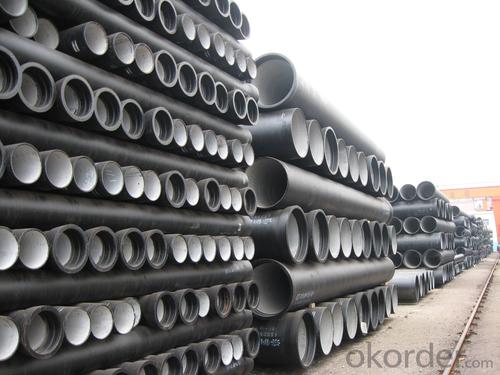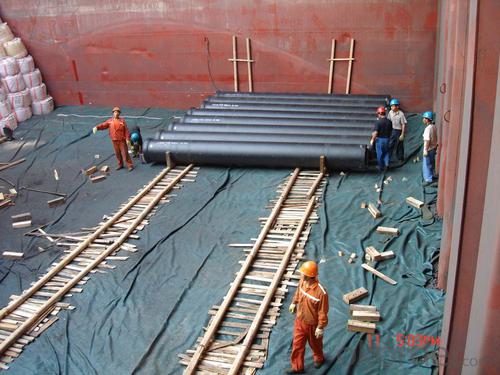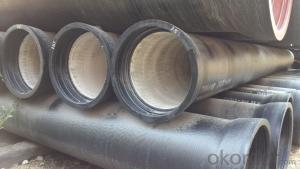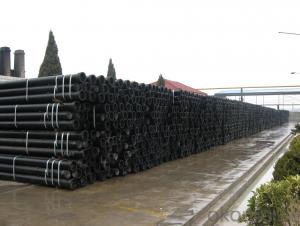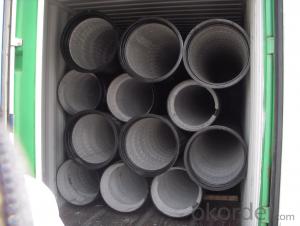Ductile Iron Pipe DN800
OKorder Service Pledge
Quality Product, Order Online Tracking, Timely Delivery
OKorder Financial Service
Credit Rating, Credit Services, Credit Purchasing
You Might Also Like
Specifications
Quick Details
| Place of Origin: | China (Mainland) | Brand Name: | CMAX | Model Number: | T type / K type / Flange type |
| Length: | 6m / 5.7m / Negotiable | Standard: | ISO2531 / EN545 / EN598 | Application: | Potable / Sewage water |
| Diameter: | DN80~DN2200 | Shape: | Round | Hardness: | 230 |
| Pipe Wall Thickness: | standard | Pull Strength: | 420 | Yield (≥ MPa): | 300 |
| Material: | Ductile Iron | Type: | Centrifugal ductile cast iron pipe | Certification: | ISO2531 / EN545 / EN598 |
| Outer Diameter: | 80-2200 | Thickness: | standard | Specification: | DN80~DN2200 |
| |
The advantages to the customer:
Trustworthy financial strength.
One-stop shopping.
Fast and efficient service.
Coordination of shipments from multiple plants.
Specialists of the overseas shipping process.
A more competitive price.
- Q: Are ductile iron pipes suitable for use in mining applications?
- Yes, ductile iron pipes are suitable for use in mining applications. Ductile iron, also known as nodular cast iron, is a type of iron that has been treated with magnesium or cerium to alter its microstructure, making it stronger and more flexible than traditional cast iron. This enhanced strength and ductility make ductile iron pipes highly resistant to impact, corrosion, and abrasion, which are common challenges in mining environments. In mining applications, ductile iron pipes are often used for various purposes such as water supply, slurry transportation, and ventilation systems. Their excellent durability and resistance to wear and tear make them ideal for handling abrasive materials, chemicals, and high-pressure fluids commonly found in mining operations. Furthermore, ductile iron pipes' ability to withstand heavy loads and external pressures makes them suitable for underground mining applications, where they may need to support the weight of overlying rock layers. Their high tensile strength and flexibility help prevent pipe failure and minimize the risk of leaks or breaks, ensuring the safety and efficiency of mining operations. Additionally, ductile iron pipes are relatively easy to install, maintain, and repair. They can be welded or joined using mechanical couplings, allowing for quick and efficient installation in mining sites. Their corrosion resistance also reduces the need for frequent maintenance and replacement, resulting in cost savings for mining companies. Overall, the superior mechanical properties and durability of ductile iron pipes make them a reliable and practical choice for use in mining applications.
- Q: Can ductile iron pipes be used for slurry transportation?
- Yes, ductile iron pipes can be used for slurry transportation. Ductile iron pipes are known for their high strength and durability, making them suitable for various applications including slurry transportation. Slurry is a mixture of solid particles and a liquid, which can be abrasive and corrosive. Ductile iron pipes have excellent resistance to abrasion, corrosion, and erosion, making them capable of handling the challenges posed by slurry transportation. Additionally, ductile iron pipes offer a smooth inner surface, reducing friction and improving the flow of slurry. Therefore, ductile iron pipes are a reliable choice for slurry transportation systems in industries such as mining, wastewater treatment, and oil and gas.
- Q: Do ductile iron pipes require internal linings for potable water?
- Internal linings are not required for potable water in ductile iron pipes. Ductile iron, a type of iron that has been strengthened and made more flexible, is commonly used in water distribution systems due to its durability and resistance to corrosion. Unlike cast iron or steel, ductile iron pipes have a protective cement-mortar lining. This lining acts as a strong barrier against corrosion and prevents the release of harmful substances into the water. It is applied during the manufacturing process and is designed to withstand the corrosive properties of potable water, eliminating the need for internal linings. Furthermore, the smooth surface of ductile iron pipes ensures the quality and flow of water without the necessity of additional linings.
- Q: What is the expected pressure rating of ductile iron pipes?
- The expected pressure rating of ductile iron pipes generally varies depending on the specific size, thickness, and application requirements. However, ductile iron pipes are known for their high strength and durability, allowing them to withstand high-pressure situations. Typically, they can handle working pressures ranging from 150 to 350 psi (pounds per square inch) or even higher, making them suitable for various water supply, wastewater, and industrial applications.
- Q: What's the function of the cement mortar lining of ductile iron pipes?
- You may easily say that this statement is vague and there is no evidence that other manufacturers often do so when promoting other types of lining. However, in order to prove the truth of the above view, we have compiled sufficient examples to demonstrate the reliability of each of these statements from a scientific and logical point of view.We have stated each of these fields and other embedded systems as specious statements. There is only a reasonable conclusion that the cement mortar lining (CML) provides excellent protection for ductile iron pipes and steel tubes.Ductile iron pipe and steel pipe CML CML produces a synergistic effect of the incomparable.
- Q: Can ductile iron pipes be used for bridge crossings?
- Ductile iron pipes are indeed suitable for bridge crossings. This material is widely used in various applications, such as water and wastewater systems, due to its strength and durability. When it comes to bridge crossings, ductile iron pipes offer numerous advantages. They possess high tensile strength, enabling them to handle the load and stress imposed by the bridge structure. In addition, they are highly resistant to corrosion, making them well-suited for environments where bridges may be exposed to moisture and other harsh conditions. Moreover, ductile iron pipes have the capability to withstand seismic activity, making them a dependable choice for areas prone to earthquakes. Overall, ductile iron pipes are a reliable and appropriate option for bridge crossings due to their strength, durability, resistance to corrosion, and ability to withstand seismic activity.
- Q: Can ductile iron pipes be used for wastewater reuse projects?
- Yes, ductile iron pipes can be used for wastewater reuse projects. Ductile iron is a strong and durable material that can withstand the corrosive nature of wastewater. It is commonly used in wastewater treatment plants and distribution systems for its ability to handle high-pressure and heavy loads. Additionally, ductile iron pipes have a long lifespan, making them a reliable choice for wastewater reuse projects.
- Q: Are ductile iron pipes suitable for underground installations?
- Yes, ductile iron pipes are suitable for underground installations. Ductile iron is a highly durable and strong material that can withstand the various pressures and stresses associated with underground environments. It has excellent resistance to corrosion, making it an ideal choice for underground applications where it may be exposed to moisture, soil, and other corrosive elements. Ductile iron pipes also have a high tensile strength, which allows them to withstand external loads and prevent cracking or breakage under ground movement or heavy traffic. Additionally, ductile iron pipes have a longer lifespan compared to other materials, making them a cost-effective option for underground installations. Overall, ductile iron pipes are a reliable and suitable choice for underground applications due to their durability, corrosion resistance, and long-term performance.
- Q: What are the different types of valves available for ductile iron pipe?
- There are several different types of valves available for ductile iron pipe, each serving a specific purpose and function. Some of the most common types of valves used with ductile iron pipe include: 1. Gate Valves: These valves are used to either completely open or close the flow of fluid within the pipe. They have a gate-like mechanism that either blocks or allows the passage of fluid when the valve is either fully open or fully closed. 2. Butterfly Valves: Butterfly valves are quarter-turn valves that use a circular disc as the closing mechanism. When the valve is open, the disc is parallel to the flow, allowing for minimal pressure drop. When the valve is closed, the disc is perpendicular to the flow, completely stopping the fluid. 3. Ball Valves: Ball valves have a spherical disc with a hole in the middle, known as a ball. When the valve is open, the ball is positioned in such a way that it allows fluid to flow through the hole. When the valve is closed, the ball is rotated to block the flow. 4. Check Valves: Check valves are designed to allow fluid to flow in one direction only, preventing backflow. They have a flap or a disc that opens when the flow is in the correct direction, and closes to stop the flow when it tries to reverse. 5. Plug Valves: Plug valves have a cylindrical or conical plug with a hole through it that can be rotated to control the flow. When the valve is open, the hole aligns with the pipe, allowing fluid to pass through. When the valve is closed, the hole is perpendicular to the pipe, blocking the flow. 6. Pressure Reducing Valves: These valves are used to control and reduce the pressure of fluid flowing through the pipe. They have a mechanism that adjusts the flow area, allowing for pressure reduction. 7. Pressure Sustaining Valves: Pressure sustaining valves are used to maintain a specific pressure within the pipe. They automatically adjust the flow area to sustain the desired pressure level. 8. Air Release Valves: Air release valves are used to release air trapped within the pipe. They allow air to escape while preventing fluid from leaking out. These are just a few examples of the different types of valves available for ductile iron pipe. The choice of valve depends on the specific application, flow requirements, and desired functionality.
- Q: Can ductile iron pipes be used for stormwater drainage systems?
- Yes, ductile iron pipes can be used for stormwater drainage systems. Ductile iron pipes are known for their strength, durability, and resistance to corrosion, making them suitable for various applications including stormwater drainage. These pipes can efficiently handle the high flow rates and heavy loads associated with stormwater runoff, making them a reliable choice for such systems.
Send your message to us
Ductile Iron Pipe DN800
OKorder Service Pledge
Quality Product, Order Online Tracking, Timely Delivery
OKorder Financial Service
Credit Rating, Credit Services, Credit Purchasing
Similar products
Hot products
Hot Searches
Related keywords



